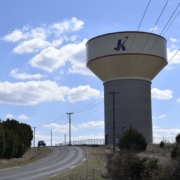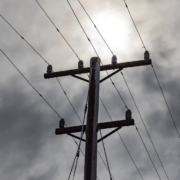Harker Heights City Council Approves Budget, Tax Rate
By Bob Massey
The Harker Heights City Council held two meetings this week to complete the tasks of conducting public hearings on the proposed Fiscal Year 2021-22 Budget and the tax rate, adopting the budget for the fiscal year beginning Oct. 1.
The council also approved the Fiscal Year 2021-2022 rates and charges, penalties for non-payment and set an effective date.
The special meeting on Monday dealt specifically with the budget and called for a unanimous vote from the council.
Tuesday’s meeting agenda dispensed information about the tax rate and also called for a unanimous vote from the council.
During the special meeting Monday, the council held a public hearing prior to adopting the budget by a unanimous vote of 5-0.
A large crowd filled the Kitty Young Council Chambers at City Hall for the meeting that lasted a little under three hours. Nine residents took advantage of the budget public hearing and came to the podium to speak to the council.
Prior to the public hearing, Finance Director Ayesha Lealiiee said, “The budget was prepared using a tax rate of 65.19 cents per $100 valuation. This budget will raise more total property taxes than last year’s budget by $665,294 or 4.9%, and of that amount $209,604 is tax revenue to be raised from new property added to the tax roll this year.”
The city’s tax rate for the fiscal year just ending is 67.7 cents per $100 valuation.
Changes made to the 2021-2022 budget since the last discussion include a budget transfer of $240,200 from the Coronovirus Fund to the General Fund, an additional $10,000 for legal fees for charter review, an additional $3,000 for the Greater Killeen Community Clinic and $8,500 for a citizen survey.
The 2022 fiscal year’s total revenues are $55,409,900 in all funds and total expenses of $64,911,100 in all funds.”
“This does not equate to the City operating at a deficit,” Lealiiee said. “The funds will be utilizing the fund balance that will carry over from the prior year bond proceeds.”
Estimated ending fund balances at Sept. 30, 2022, total $18,688,025 and of this amount, $3,987,574 are restricted for specific uses.
Lealiiee said, “Three-month reserve requirements in the General Utility funds total $7,727,250. These reserve requirements were not implemented just as a ‘rainy day fund’ but shows the city as being fiscally strong in the eyes of bond rating agencies. This leaves an estimated fund balance of $6,973,201 remaining in all funds.
Moving to the public hearing portion of the meeting, three of those who spoke have served as former members of the council.
Two of the former councilmen, John Reider and Hal Schiffman, shared their support of the council and the adoption of the proposed budget.
Reider focused on the connection between the tax rates that citizens pay and the need for the public to protest what the tax appraisal district is doing to all residents.
“All the taxing entities play a role and I’m behind what you’re doing and I encourage you to be conservative,” he said.
Schiffman said, “I commend our city administration for their conservative administration of tax revenues while maintaining a high level of service. We’re constantly threatened by our Legislature to raise revenue and that’s where we are now. Speaking of reserves, we are floating to earth safely and without additional financial duress on our residents as our roads and streets are repaired.”
Richard Keagle, who has not served on the council, said, “Regardless of what the council members decide, my taxes will increase because property values have increased. The council could have decided to raise our taxes (tax rate) but they lowered them. Thank you, council.”
Randy Schoel, who served on the council many years ago, took issue with the reserves in the budget.
Schoel said, “What I’d ask you to do is take some of that money you’re putting in reserves and form an economic development corporation.
“We’re doing great without one,” Councilman Michael Blomquist said.
Schoel responded over whispers in the crowd, “You have the slowest economic growth in Bell County and the only one that doesn’t have an EDC.
Blomquist disagreed and Schoel said he would debate that issue.
Local resident Lynne Boehm asked the council, “How much are you going to save a month between a 65.19 cent tax rate and the no-new-revenue rate? Assuming you have a home worth $250,000, the difference between the proposed tax rate and the no-new-revenue tax rate is $4.30 per month. I don’t think that it’s worth it to me and my family for the services we will lose.”
Council member Sam Halabi said, “Thank you for your comments. This is our home, too and thank you for bringing up the positive side.”
Howard Arey said, “Finally, the council, perhaps recognizing that its non-answers to citizen questions was not protected by state law, needed to interact and they did. It brought out the best of council members and it brought out the worst of council members. Others can discuss that as they desire.”
On Tuesday evening, the council levied a tax rate of 65.19 cents per $100 valuation comprised of 50.73 for maintenance and operations and 14.56 cents for debt service for Fiscal Year 2021-2022 (Tax Year 2021).
A motion was also made that the property tax be increased by the adoption of a tax rate of 65.19 cents, which is effectively a 3.39% increase in the tax rate.
Finance Director Lealiiee reported that the proposed tax rate for Harker Heights decreased by 3.85% second behind Killeen with a decrease of 4.65%.
The average value of a home in Harker Heights increased by 8.72% in comparison to last year.
The tax on an average home in Harker Heights increased by 4.69%.
No residents spoke during the public hearing on the proposed tax rate, so the council followed by taking a unanimous vote on adopting the 65.19 cents per $100 valuation tax rate.
In other business, the council approved the development of an arts commission for the city. A change in the ordinance was recommended during a Sept. 7 workshop.
The change is in Article III-Section 1. Membership (c) now reads, “All voting members of the commission shall be qualified electors of the City of Harker Heights”. This will not apply to the city staff member appointed to the committee, as staffers are non-voting members.
Finally, Public Works Director Mark Hyde recommended approving an ordinance amending Chapter 33 of the Code of Harker Heights to remove the Assistant Public Works Director and the Public Works Customer Relations Supervisor from the Storm Water Committee and adding the Public Works Administrative Assistant to the Storm Water Committee.
The council approved the change with a 5-0 vote.









Leave a Reply
Want to join the discussion?Feel free to contribute!